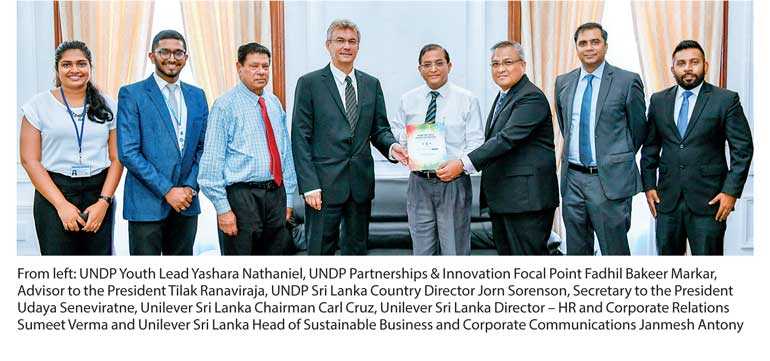Friday Feb 20, 2026
Friday Feb 20, 2026
Friday, 21 September 2018 00:00 - - {{hitsCtrl.values.hits}}

Unilever Sri Lanka Chairman Carl Cruz and United Nations Development Programme (UNDP) Country Director Jorn Sorensen recently handed over a policy action paper for the promotion of public private partnerships for sustainable development to the Secretary to the President of Sri Lanka, Udaya Seneviratne.
The paper was the direct result of last year’s Unilever-UNGC-UNDP Forum which brought together Sri Lanka’s business leaders across a myriad of industries in the private sector, key personnel from the public sector, and key development partners to work on driving mutually beneficial partnerships towards the achievement of key priorities related to the 2030 Sustainable Development Goals (SDGs).
As a signatory of the SDGs in 2015 Sri Lanka has committed to making a sustainable change today for a better tomorrow. However, the scope of the changes, which span the breadth and length of the nation and will ultimately impact every citizen, needed the unprecedented cooperation of both the public and private sector.
The Forum in 2017 discussed the best practices for moving these Public-Private Partnerships (PPP) forward and ensuring their long term sustainability. The policy paper highlights the immediate next steps that need to be taken to align project goals to the wider national agenda.
Seneviratne said, “It is important to understand that we stand at the precipice of far reaching change and change at that magnitude cannot be achieved by any one entity alone. It needs the cooperation of an entire nation – both the public and private sectors working in unison towards a common goal. While the government continues to work towards bringing about sustainable development we commend the private sector for taking up the cause as well. I look forward to seeing the steps outlined in this policy paper in action.”
Cruz said: “The changes required by the SDGs are neither small nor narrow. Therefore, if we are to achieve these goals we must work together to help the nation realize its vision of a brighter future. Only together can we bring long term sustainable change to the nation and help propel its growth. The steps that we as a nation need to take are outlined in the policy paper that we handed over to the President’s Secretary. We look forward to working closely with our partners – in both the public and private sectors – to bring about the change Sri Lanka needs.”
Sorensen said, “Sustainable development is the future and by investing in it now, we are securing Sri Lanka’s place in that future. However, to achieve sustainable development we will need the Government, businesses and development partners to work together towards our collective vision for the nation. The outline for this collaborative framework is laid out in the policy paper that we handed over to the President. UNDP is proud to be a catalyst in convening these stakeholders and helping them unleash their true potential for change.”
The policy paper outlines several projects targeted at specific SDGs. These include project SustainabiliTEA which will target sustainable agriculture. The aim of the project is to ensure that all tea produced in Sri Lanka comply with sustainable agricultural practices by 2020. Partners in the project are Unilever Sri Lanka, Aitken Spence, Dialog Axiata, and Sri Lanka Tea Federation.
Project Grama Shakthi will target the economic inclusion of women by reaching out to directly engage with women in 7000 (50%) villages across the island and provide them with housing, education and encouragement to become entrepreneurs. Partners in the project are the Presidential Secretariat, Ministry of Education, Ministry of Women and Child Affairs, Unilever Sri Lanka, Commercial Bank and MAS.
Project Sunlight will target waste management by converting 5,000 retail outlets to solar energy by 2020. Partners in the project are the Ministry of Power and Renewable Energy, Unilever Sri Lanka, Commercial Bank, and Aitken Spence.
This year’s forum, which is set to take place shortly, will tackle four more key areas of national importance thereby scaling for impact and widening the footprint of these PPPs. The four areas are namely conservation of threatened species and sustainable tourism; water management; community empowerment; and chronic kidney disease prevention. Ultimately, within a framework of collaboration, these partnerships will steer Sri Lanka towards a sustainable future.